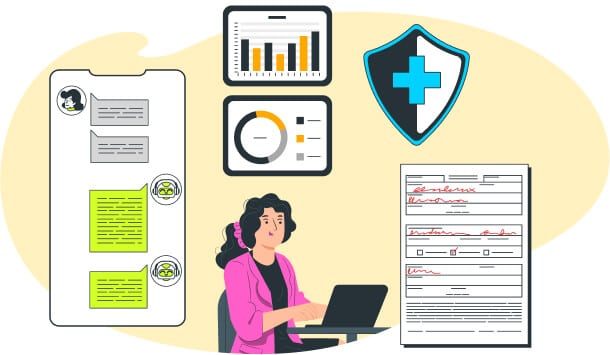Leveraging AI to Mitigate the Challenges of Healthcare Payer Operations


By Jill Dillingham
Jill Dillingham is the VP of Healthcare at 10Pearls, a global digital transformation company helping businesses innovate, digitalize, and scale.
Leveraging AI to mitigate the challenges of healthcare payer operations
Today’s payer market is playing defense against rising costs and an ever-increasing number of regulatory guidelines while trying to balance a central mission of improved member outcomes. Amidst these challenges lies a game-changing and polarizing technology: Artificial Intelligence. By thoughtfully harnessing the capabilities of AI, healthcare payers can accelerate their operations, drive efficiency, accuracy, and ultimately, better health outcomes for their members.

Fraud detection and prevention
Healthcare fraud leads to billions of dollars in losses annually. Unlike sluggish and inconsistent legacy processes, AI algorithms can analyze vast amounts of claims data to detect patterns indicative of fraud. By flagging suspicious claims in real time, payers can mitigate financial losses consistently and proactively. It’s a methodology that’s an industry standard in the credit industry and has been introduced in the Senate as a priority initiative for CMS. The legislation would “require Medicare to test two tools: AI-trained algorithms to detect suspicious activity and a system to quickly alert Medicare patients on whose behalf payment is being sought.”
A FWA intervention driven by AI has become a mission-critical item for all payers. As healthcare has become more complex, the ever-evolving nature of medical codes, payer policies, and federal regulations makes it challenging to understand and address the breadth of potential vulnerabilities. Even well-intentioned providers may commit health care FWA. Unless payers have a comprehensive AI strategy in place, they may not be able to detect FWA.
Predictive analytics for risk management
AI-powered predictive analytics allows payers to assess individual patient risk factors accurately. Traditionally, risk mitigation analysis jogged along utilization. With AI-driven analysis of historical data that leverages machine learning algorithms, payers can identify patients at high risk for a host of medical events or conditions sooner. This proactive approach allows for early interventions, such as targeted preventive care programs or care management initiatives. With that, payers can realize a reduction in healthcare costs while improving patient outcomes—a win for all value chain sectors.

Claims processing automation

Traditional claims processing workflows are often labor-intensive and prone to errors. AI technologies, including natural language processing (NLP) and optical character recognition (OCR), streamline this process by automatically extracting relevant information from claims documents. Payers can accelerate processing times, reduce administrative costs, and improve accuracy and compliance by automating routine tasks, such as data entry and claims adjudication.
The big headline is AI’s verifiable impact on payer’s bottom line. In 2023, 10Pearls stood up an Automated Claims Matching Solution that streamlined processes between claims exceptions and prior authorizations led to improved patient claim resolution to the tune of $17M in lowered costs savings in just the first 4 months.
Personalized care management
In healthcare, sometimes blanket rules or metrics cannot apply. Every patient is unique, with distinct healthcare needs and preferences. AI-driven algorithms analyze patient data, including medical history, demographic information, and lifestyle factors — Social Determinants of Health. With all that member-centric information, AI is able to tailor personalized care plans and interventions. By delivering targeted interventions and support, payers can empower patients to take control of their health, improve adherence to treatment regimens, and achieve better health outcomes.
Whether it is a tool activated when members are onboarding or within post-acute care, AI’s person-centric power can optimize medical decision-making, member experience, clinical outcome, and more.

Virtual connections and chatbots
The Medicare Stars program is a case in point of the importance of member satisfaction in the value chain. Providing exceptional customer service, education, and access is essential for payers looking to enhance NPS, acquisition, retention, and outcomes. AI-powered virtual agents and chatbots offer a scalable solution for addressing member inquiries, clarifying coverage details, and assisting with claims adjudication. By leveraging natural language (back to personalization) and machine learning, a virtual agent can provide bespoke support in real-time that is finely tuned to that particular member, thereby improving the overall member experience.

Part of the beauty of AI when it comes to personalized care is that it creates authentic personalization. In a world driven by metrics, we all readily accept that a relaxed and educated patient/member will have a better outcome. They know what their healthcare plan does and how to access the care and are more likely to adhere to their care. In a post-acute setting, the simple application of language models with a virtual care connection can radically improve outcomes while creating relief for caregivers & providers. 10Pearls has redefined caregiving with AI virtual agents – developing a self-learning virtual companion trained to provide empathetic and compassionate support through sentiment analysis in multiple languages to family caregivers.
Transforming healthcare payer operations with AI
AI holds immense potential to transform healthcare payer operations and lift KPIs across the entire organization. By implementing AI-driven insights and tools, payers can streamline processes, effectively mitigate risk, and ultimately deliver better outcomes for their members (and their bottom line).